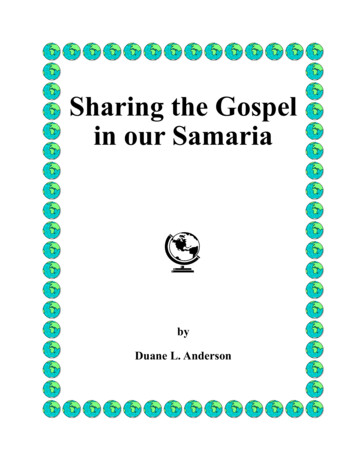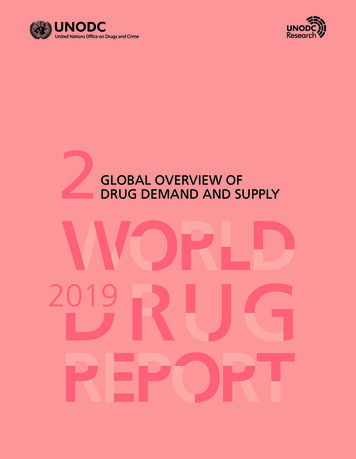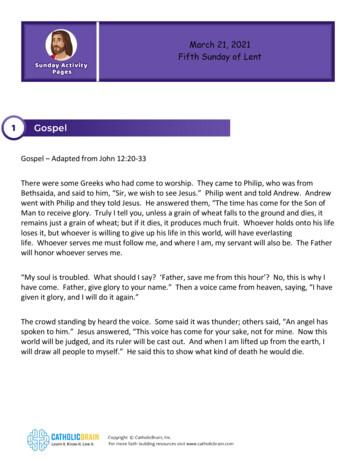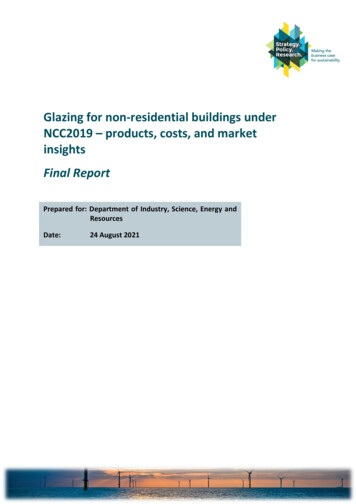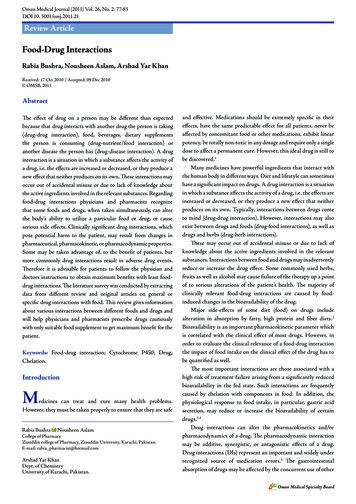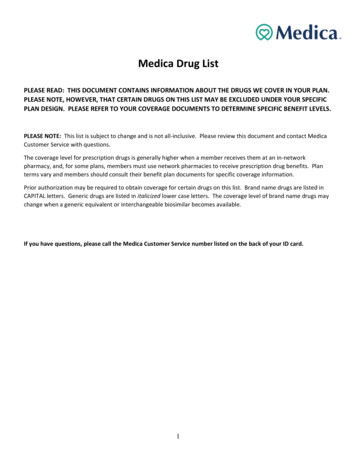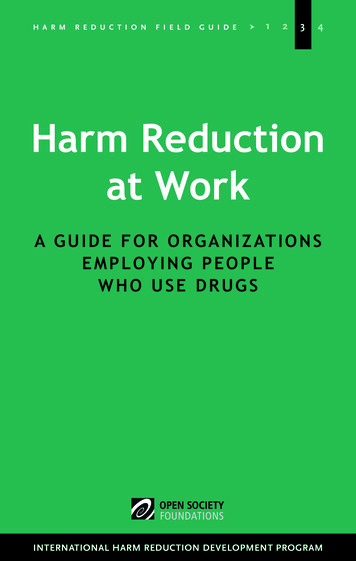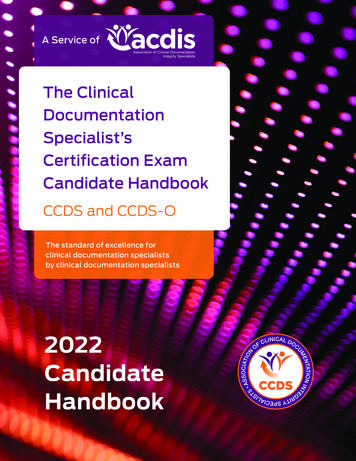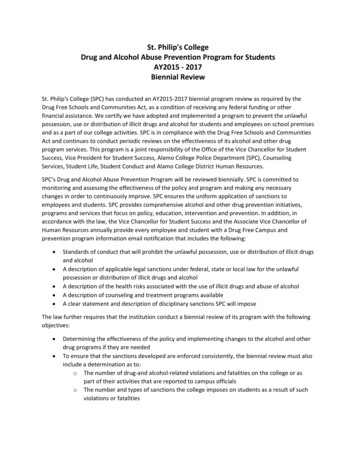
Transcription
St. Philip's CollegeDrug and Alcohol Abuse Prevention Program for StudentsAY2015 - 2017Biennial ReviewSt. Philip's College (SPC) has conducted an AY2015-2017 biennial program review as required by theDrug Free Schools and Communities Act, as a condition of receiving any federal funding or otherfinancial assistance. We certify we have adopted and implemented a program to prevent the unlawfulpossession, use or distribution of illicit drugs and alcohol for students and employees on school premisesand as a part of our college activities. SPC is in compliance with the Drug Free Schools and CommunitiesAct and continues to conduct periodic reviews on the effectiveness of its alcohol and other drugprogram services. This program is a joint responsibility of the Office of the Vice Chancellor for StudentSuccess, Vice President for Student Success, Alamo College Police Department (SPC), CounselingServices, Student Life, Student Conduct and Alamo College District Human Resources.SPC's Drug and Alcohol Abuse Prevention Program will be reviewed biennially. SPC is committed tomonitoring and assessing the effectiveness of the policy and program and making any necessarychanges in order to continuously improve. SPC ensures the uniform application of sanctions toemployees and students. SPC provides comprehensive alcohol and other drug prevention initiatives,programs and services that focus on policy, education, intervention and prevention. In addition, inaccordance with the law, the Vice Chancellor for Student Success and the Associate Vice Chancellor ofHuman Resources annually provide every employee and student with a Drug Free Campus andprevention program information email notification that includes the following: Standards of conduct that will prohibit the unlawful possession, use or distribution of illicit drugsand alcoholA description of applicable legal sanctions under federal, state or local law for the unlawfulpossession or distribution of illicit drugs and alcoholA description of the health risks associated with the use of illicit drugs and abuse of alcoholA description of counseling and treatment programs availableA clear statement and description of disciplinary sanctions SPC will imposeThe law further requires that the institution conduct a biennial review of its program with the followingobjectives: Determining the effectiveness of the policy and implementing changes to the alcohol and otherdrug programs if they are neededTo ensure that the sanctions developed are enforced consistently, the biennial review must alsoinclude a determination as to:o The number of drug-and alcohol-related violations and fatalities on the college or aspart of their activities that are reported to campus officialso The number and types of sanctions the college imposes on students as a result of suchviolations or fatalities
SPC acknowledges its legal obligation to conduct a biennial review of compliance with the Drug- FreeSchools and Communities Act and authorizes an administrative review to be conducted to determine ifthe college fulfills the requirements of the previously mentioned Federal regulations. The Vice Presidentfor Student Success along with the Strategies for Behavioral Intervention (SOBI) team is responsible forconducting the review and reporting on the findings. The SOBI team consists of representatives fromboth St. Philip’s College campuses serving in various roles across the college to include the VicePresident for Student Success, the Dean of Student Success, Campus Police, Counseling Services,Disability Services, Student Life, Student Conduct, Advising, and Enrollment Management.The following college units provide information for biennial reports: Division of Student SuccessCampus PoliceCounseling ServicesDisability ServicesStudent LifeStudent ConductNew Student OrientationStrategies for Behavioral InterventionHuman ResourcesThe intention of this report is to meet the legal requirements of conducting a biennial review and alsosummarize the programs and activities related to alcohol and drug prevention at SPC during theacademic years for 2015 – 2017.The following information was examined for the biennial review: Alcohol and drug information provided to studentsStudent Code of Conduct and infraction sanctionsStudent Handbook policies related to drug and alcohol use by college employees and thesanctions imposed for failure to complySPC's expectations for student behaviorVarious resources available to students regarding drug and alcohol abuse (Student Code ofConduct, Student Handbook, catalog, counseling website, New Student Orientation materials,etc.)Maxient incident reports related to infractions of the drug and alcohol policyCommunications (email, presentations, flyers, TV monitors, New Student Orientation, etc.)Local, State and Federal mandatesCOMPLIANCE WITH DRUG-FREE SCHOOLS AND COMMUNITIES ACTSPC strives to remain in compliance with the requirements of the Drug-Free Schools and CommunitiesAct. The college has adopted and implemented programs to prevent the abuse of alcohol and use ordistribution of illicit drugs both by students and employees both on its premises and as part of any ofthe college's activities. SPC has a written policy on alcohol and other drugs and briefs this to studentsduring New Student Orientation, via the online Student Handbook, through access to the online College
Catalog, online Student Code of Conduct and online Student Handbook. The materials are located on ourwebsite and contain the following: Standards of conduct that will prohibit the unlawful possession, use or distribution of illicit drugsand alcoholA description of applicable legal sanctions under federal, state or local law for the unlawfulpossession or distribution of illicit drugs and alcoholA description of the health risks associated with the use of illicit drugs and abuse of alcoholA description of counseling and treatment programs availableA clear statement and description of disciplinary sanctions SPC will imposeThe federally mandated policy about alcohol and other drugs are discussed, in more detail, withstudents during orientation.DRUG AND ALCOHOL INTERVENTION PREVENTION AND TREATMENTCounseling Services provide students with information about and referrals to support, education and/ortreatment community resources. St. Philip's College has two full-time Personal Counselors who assiststudents through on/off-campus resources to include counseling and treatment, if needed. SPCcounseling services are free and confidential. If it is deemed appropriate and/or necessary, thecounselors will provide a list of off-campus resources, agencies and centers that provide referrals ortreatment for alcohol and/or drug dependence and/or abuse. Students can contact these agenciesdirectly or the counselor can facilitate contact on their behalf with their approval. Additional resourcesare provided via The United Way of San Antonio and Bexar County Resource Database.Local Support Groups Alcoholics Anonymous- Central Service Office of San AntonioEsperanza Area Narcotics AnonymousSouth Central Texas Area Cocaine Anonymous Local Treatment CentersLocal Treatment Centers Alpha HomeBexar County Substance Abuse Resources Directory http://www.bexarlist.org/Center for Health Care Services- Central Outpatient UnitFamily Service Association of San AntonioHope Action CareLifetime RecoveryPalmer Drug Abuse Program- Central Outpatient UnitStarlite Recovery Center/CRC Health Corp.Counseling Services Annual Events: National Depression Screening DaysAlcohol Awareness Screening EventsFree Online Alcohol Awareness Screening (posted on website atwww.alamo.edu/spc/counseling-services/
SPC Student Life Events Drug and Alcohol Awareness Email to all SPC StudentsSan Antonio Coalition on Alcohol and Drug Abuse (SACADA) AwarenessFatal Vision Impairment Goggles Demonstrations (in partnership with Campus Police andCounseling Services)Annual Student Leader & Extramural Athletic TrainingInformational Brochures Made Available in Counseling Services such as: Binge DrinkingAlcohol & Combat StressDrug FactsNormal Drinking BehaviorCycle of ViolenceCollege-Wide Substance Abuse Prevention Committee:St. Philip’s College has a Title IX and Substance Abuse Prevention Committee. The mission of thecommittee is: Empowering the SPC community to create a culture of safety as its members makedecisions around substance use, relationships, and overall experiences on campus. The committeemembers include faculty, staff and administrators who are committed to learning how the misuse ofsubstances impacts student success. The committee meets monthly to share knowledge aboutsubstance use in the SPC community and effective helping techniques such as how to refer students tothe appropriate resources. Members are informed and serve as change agents in their circles ofinfluence. The committee assesses the college’s efforts related to awareness, prevention, and responseto substance misuse and abuse.EMPLOYEESSPC employees, dependents and other individuals residing in their household are eligible to participatein the Alamo College District Employee Assistance Program. The Employee Assistance Program is aconfidential benefit prepaid by Alamo College District that provides such services as short-termcounseling and assessments, referrals, prevention/education resources, and crisis intervention. Servicesinclude: DepressionAnxietyInterpersonal, Familial, or Marital ConflictsGrief: Death and DyingADHD and Conduct ProblemsSubstance AbuseStress ManagementChildcare/EldercareOccupational issuesCrisis ManagementWorkplace Violence
Trauma: Abuse/NeglectDomestic ViolenceFinancial, Health or legal DifficultiesEmployees are also required to complete an annual Drug-Free Workplace and Drug- Free Campus onlineeducation and prevention program.COLLEGE SUCCESS SUMMARYAll SPC students are responsible for complying with Texas laws and Alamo College District policies. Theseguidelines establish that: No person under 21 years of age may use or be in possession of alcoholic beveragesAlcoholic beverages may not be available to minorsMisrepresentation of age for the purpose of purchasing alcoholic beverages is a violation ofstate lawPersonal possession and consumption of alcoholic beverages is not permitted at social eventsattended by students, or on college facilitiesStudents are prohibited from consuming, transporting and distributing alcohol; possessing orbeing in the presence of alcohol while on campus; or exhibiting disruptive behaviorAlcohol found by an employee will be reported to Alamo College District police and disposed ofimmediately. Persons found in violation of this policy will be subject to administrative or disciplinarysanctions outlined in the College Catalog and Student Code of Conduct include:oooooWarning: A formal statement that the behavior was unacceptable and a warning that furtherinfractions of any Alamo College District-SPC policy, procedure or directive may result in moresevere sanctions/responsive actions.Administrative Hold: Registration, transcripts or degree may be withheld for a student who failsto pay a debt owed to the college or who has a disciplinary case pending final disposition. Thepenalty terminates upon payment of the debt or final disposition of the case.Educational Enrichment: A disciplinary action designed to advance student learning which mayinclude self-help workshops, seminars and counseling, etc.Probation: A written reprimand for violation of the Student Code of Conduct, providing moresevere disciplinary sanctions in the event that the student or organization is found in violation ofany college policy, procedure or directive within a specified period of time. Terms of theprobation will be specified and may include denial of specified social privileges, exclusion fromco-curricular activities, non-contact orders, and/or other measure deemed appropriate. If astudent is found responsible for a second violation of the Student Code of Conduct while onprobation, additional and more severe sanctions may be imposed up to and including expulsion.Suspension: Termination of student status for a definite period of time not to exceed two yearsor until specific criteria is met. Criteria may include an administrative conference, petition toreturn to the Alamo College District or other documentation required by the Chief StudentAffairs Officer or designee. Students who return from suspension are subject to all applicationprocesses and automatically placed on probation for one calendar year. This sanction may benoted as a Conduct Suspension on the student's official transcript.
oooExpulsion: Permanent termination of student status and permanent revocation of the right toenroll at any Alamo College. Expulsion may include any right to access the College campus orevent. Before a sanction of expulsion is imposed, the President of the College shall automaticallyreview and approve or reverse every expulsion upon concurrence by the Chancellor. Thissanction may be noted as a Conduct Expulsion on the student's official transcript.Other Actions: In addition to or in place of the above sanctions, Alamo College District-SPC mayassign any other sanctions as deemed appropriate.Possible arrest, imprisonment, or fine according to state drug and alcohol laws.COLLEGE INCIDENT REPORT SUMMARY AY2015- 2017 TOTAL REPORTS: 0FATALITIES ON CAMPUS OR AT A COLLEGE ACTIVITY: 0ENFORCEMENTThe primary source on campus that enforces the alcohol and drug policies is the Vice President forStudent Success along with Alamo College's police officers. The Office of the Vice President for StudentSuccess works with all necessary parties to handle interventions and/or sanctions. It is the primaryresponsibility of the Director of Student Conduct/Title IX to assess instances of violations by students todetermine sanctions or involve the Disciplinary Review Committee which will recommend any necessarysanctions. For AV 2015 - 2017 there were no violations; however, when violations occur, they follow theAlamo College District procedure for adjudicating student conduct. Procedure is outlined in AlamoCollege District Policy F.4.2.1 Non-Academic Misconduct Disciplinary and Appeal Process (Procedure).The Alamo College District police officers follow all local, state and federal laws when determining lawenforcement actions and sanctions. They provide daily activity reports to the President, Vice Presidents,Dean of Student Success, Director of Student Conduct and other area leaders deemed appropriate. Ourlegal department provides consultation and guidance to ensure that we follow all Alamo College DistrictSPC policies and local, state and federal laws.OVERVIEW OF HEALTH RISKS AND EFFECTSSt. Philip’s College seeks information from a variety of federal, state and local resources: The U.S. DrugEnforcement Administration, Texas Department of Public Safety and San Antonio Council on Alcohol andDrug Abuse. Outlined below is a listing of drugs of abuse and their health risks taken from the U.S. DrugEnforcement Administration website (https://www.dea.gov/index.shtml).AlcoholAlcohol (beer, wine or liquor) has a high potential for physical and psychological dependence as well asresulting in increased tolerance. Possible effects include impaired memory, slurred speech, drunkenbehavior, slow onset, vitamin deficiency and organ damage. Overdose may result in vomiting,respiratory depression, loss of consciousness and possible death. Withdrawal may include trembling,anxiety, insomnia, vitamin deficiency, confusion, hallucinations, and convulsions. Females who drink
alcohol during pregnancy may give birth to infants with Fetal Alcohol Syndrome. These infants haveirreversible physical abnormalities and mental retardation. In addition, research indicates that childrenof alcoholic parents are at greater risk than other youngsters of becoming alcoholics. Alcohol use isoften related to acquaintance rape and failure to protect oneself from sexually transmitted diseases(STDs). Additionally, alcohol-related accidents are the number one cause of death in the 16- to 24-yearold age group.NarcoticsNarcotics (including heroin, morphine, hydrocodone, oxycodone, codeine, and others) have a highpotential for both physical and psychological dependence as well as resulting in increased tolerance. Thepossible effects of using narcotics include euphoria, drowsiness, respiratory depression, constrictedpupils, and nausea. Overdose may result in shallow breathing, clammy skin, convulsions, coma, anddeath. Withdrawal may include irritability, tremors, panic, nausea, chills, and sweating.Other DepressantsOther depressants (including GHB or liquid ecstasy, valium, Xanax, Ambien and barbiturates) have apotential for both physical and psychological dependence as well as resulting in increased tolerance. Thepossible side effects include slurred speech, disorientation, appearance of intoxication, and impairedmemory. Overdose may result in shallow respiration, clammy skin, dilated pupils, weak and rapid pulse,coma and possible death. Withdrawal may include anxiety, insomnia, tremors, delirium, convulsions andpossible death.StimulantsStimulants (including cocaine, methamphetamine and methylphenidate) have a possible risk of physicaldependence and high risk for psychological dependence. Tolerance can develop in all stimulants. Thepossible side effects include increased alertness, excitation, euphoria, increased pulse rate and bloodpressure, insomnia and decreased appetite. Overdose may result in agitation, increased bodytemperature, hallucinations, convulsions and possible death. Withdrawal may result in apathy, longperiods of sleep, irritability, depression and disorientation.HallucinogensHallucinogens (including methylenedioxy-methamphetamine (MOMA), popularly known as ecstasy or,more recently, as Molly, LSD, Phencyclidine, and others) are less likely to result in physical dependence,with the exception of phencyclidines and analogs, and vary in terms of psychological dependence,ranging from none to moderate (MOMA) to high (phencyclidine and analogs).Tolerance can develop. Possible effects include heightened senses, teeth grinding and dehydration(MOMA and analogs) and hallucinations, altered perception of time and distance in other types ofhallucinogens. Overdose may result in increased body temperature and cardiac arrest for MOMA andmore intense episodes for LSD. Some hallucinogens may result in muscle aches and depression when inwithdrawal {MOMA) or may result in drug seeking behavior.Cannabis
Cannabis includes marijuana, tetrahydrocannabinol {THC), and hashish or hashish oil. All may result inmoderate psychological dependence with THC resulting in physical dependence. Tolerance can developin all forms. Possible effects include euphoria, relaxed inhibitions, increased appetite and disorientation.Overdose may result in fatigue, paranoia and possible psychosis. Withdrawal may occasionally result ininsomnia, hyperactivity and decreased appetite.Anabolic SteroidsAnabolic Steroids (including testosterone and others) may result in psychological dependence. Less isknown as to their potential for physical dependence and increased tolerance levels. Possible effects mayinclude edema, testicular atrophy, gynecomastia, acne and aggressive behavior. Effects of overdose areunknown. Withdrawal may possibly include depression.InhalantsInhalants (including amyl and butyl nitrite, nitrous oxide, and others) vary in their level of psychologicaldependence, with less known about their potential for physical dependence and tolerance. Possibleeffects may include flushing, hypotension, headache, impaired memory, slurred speech, drunkenbehavior, slow onset, vitamin deficiency and organ damage. Overdose may result in vomiting,respiratory depression, loss of consciousness and possible death. Withdrawal may result in agitation,trembling, anxiety, insomnia, vitamin deficiency, confusion, hallucinations and convulsions.ATHLETICS, HOUSING AND GREEK LIFESt. Philip's College does not have intercollegiate athletics, housing or Greek life organizations.POLICYSPC strives to maintain a college community free from the illegal use, possession or distribution ofalcohol or of controlled substances and has adopted related policies:F.4.5 {Policy) Alcohol and Drug .pdfF.4.5.Ex (Exhibit) Notice and Information on Illegal Drugs and Steroidshttp://www.alamo.edu/uploadedFi cies/F.4.5Policy.pdfCONCLUSION OF AY2015-2017 REVIEWSPC is committed to providing its students a drug and alcohol free learning environment. We willcontinue to monitor and review our current practices to continually improve our process, training,communications and support to our students. Toward that end, SPC prohibits the unlawful possession,use, manufacture or distribution of unauthorized drugs and alcohol in the workplace, on the campus orat any SPC activities. SPC shall continue to provide a safe, responsive environment for all students.There are many people whose academic performance and productivity are adversely affected by theirdependence on drugs and alcohol. To address this issue, SPC will continue to strive to:
Educate students about alcohol and drug abuse to encourage responsible decisionsPromote constructive lifestyles and norms that discourage alcohol and drug abuse, andDevelop social and physical environments that facilitate alcohol and drug abuse-free lifestylesAs part of the commitment to the provision of high quality and effective service to our students, and thepublic, SPC has a drug and alcohol abuse prevention program in operation. The program is accessible toall members of the college community. SPC is committed to the dissemination of drug and alcoholawareness information to students, faculty and all employees.Adena Williams Loston, Ph.D.President, St. Philip’s CollegeDateA hard copy of the AY 2015-2017 Biennial Review of SPC’s alcohol and drug program is available via hard copy in theOffice of the Vice President for Student Success that can be provided to the U.S. Department of Education asrequested.
Drug and Alcohol Abuse Prevention Program for Students AY2015 - 2017 Biennial Review St. Philip's College (SPC) has conducted an AY2015-2017 biennial program review as required by the Drug Free Schools and Communities Act, as a condition of receiving any federal funding or other financial assistance.

